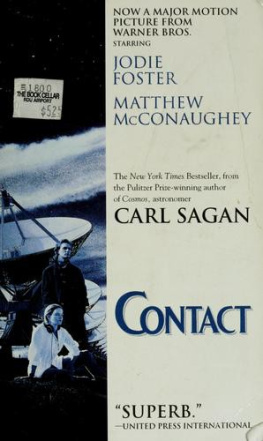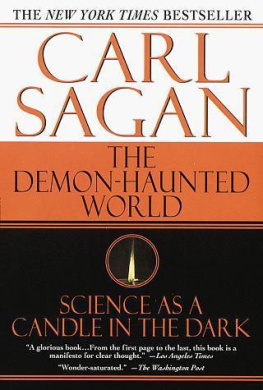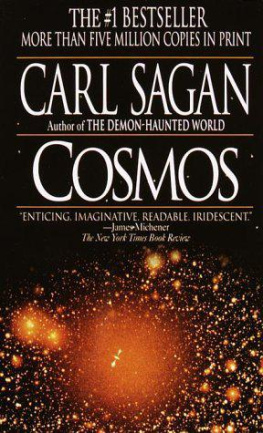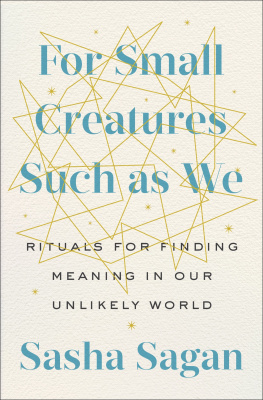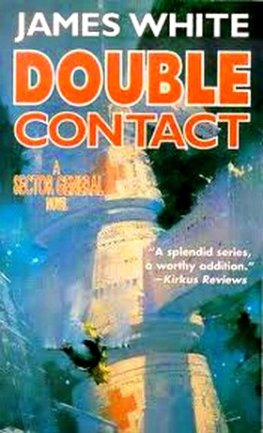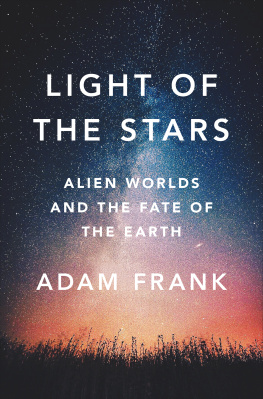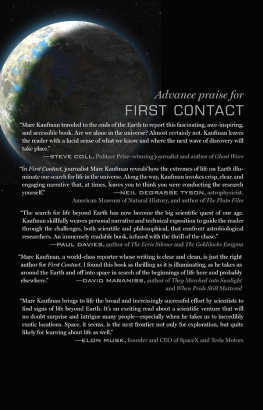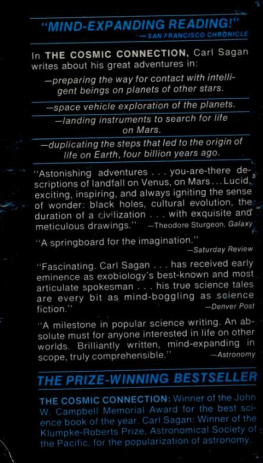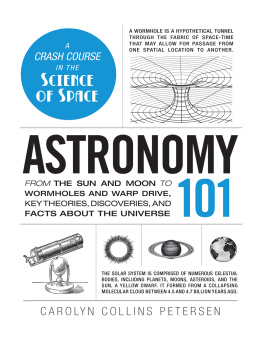CONTACT
By Carl Sagan
For Alexandra,
who comes of age
with the Millennium.
May we leave your generation a world
better than the one we were given.
PART I
THE MESSAGE
My heart trembles like a poor leaf.
The planets whirl in my dreams.
The stars press against my window.
I rotate in my sleep.
My bed is a warm planet.
-MARVIN MERCER
P.S. 153, Fifth Grade, Harlem
New York City, N.Y. (1981)
CHAPTER 1
Transcendental Numbers
Little fly,
Thy summer's play
My thoughtless hand
Has brushed away.
Am not I
A fly like thee?
Or art not thou
A man like me?
For I dance
And drink and sing,
Till some blind hand
Shall brush my wing.
-WILLIAM BLAKE
Songs of Experience
"The Fly," Stanzas 1-3 (1795)
By human standards it could not possibly have been artificial: It was the size of a world. But it was so oddly and intricately shaped, so clearly intended for some complex purpose that it could only have been the expression of an idea. Gliding in polar orbit about the great blue-white star, it resembled some immense, imperfect polyhedron, encrusted with millions of bowl-shaped barnacles. Every bowl was aimed at a particular part of the sky. Every constellation was being attended to. The polyhedral world had been performing its enigmatic function for eons. It was very patient. It could afford to wait forever.
When they pulled her out, she was not crying at all. Her tiny brow was wrinkled, and then her eyes grew wide. She looked at the bright lights, the white and green-clad figures, the woman lying on the table below her. On her face was an odd expression for a newborn-puzzlement perhaps.
* * *
When she was two years old, she would lift her hands over her head and say very sweetly, "Dada, up." His friends expressed surprise. The baby was polite. "It's not politeness," her father told them. "She used to scream when she wanted to be picked up. So once I said to her, `Ellie, you don't have to scream. Just say, "Daddy, up."' Kids are smart. Right, Presh?"
So now she was up all right, at a giddy altitude, perched on her father's shoulders and clutching his thinning hair. Life was better up here, far safer than crawling through a forest of legs. Somebody could step on you down there. You could get lost. She tightened her grip.
Leaving the monkeys, they turned a corner and came upon a great spindly-legged, long-necked dappled beast with tiny horns on its head. I towered over them. "Their necks are so long, the talk can't get out," her father said. she felt sorry for the poor creature, condemned to silence. But she also felt a joy in its existence, a delight that such wonders might be.
* * *
"Go ahead, Ellie," her mother gently urged her. There was a lilt in the familiar voice. "Read it." Her mother's sister had not believed that Ellie, age three, could read. The nursery stories, the aunt was convinced, had been memorized. Now they were strolling down State Street on a brisk March day and had stopped before a store window. Inside, a burgundy-red stone was glistening in the sunlight. "Jeweler," Ellie read slowly, pronouncing three syllables.
* * *
Guiltily, she let herself into the spare room. The old Motorola radio was on the shelf where she remembered it. It was very big and heavy and, hugging it to her chest, she almost dropped it. On the back were the words "Danger. Do Not Remove." But she knew that if it wasn't plugged in, there was no danger in it. With her tongue between her lips, she removed the screws and exposed the innards. As she had suspected, there were no tiny orchestras and miniature announcers quietly living out their small lives in anticipation of the moment when the toggle switch would be clicked to "on." Instead there were beautiful glass tubes, a little like light bulbs. Some resembled the churches of Moscow she had seen pictured in a book. The prongs at their bases were perfectly designed for the receptacles they were fitted into. With the back off and the switch "on," she plugged the set into a nearby wall socket. If she didn't touch it, if she went nowhere near it, how could it hurt her?
After a few moments, tubes began to glow warmly, but no sound came. The radio was "broken," and had been retired some years before in favor of a more modern variety. One tube was not glowing. She unplugged the set and pried the uncooperative tube out its receptacle. There was a metallic square inside, attached to tiny wires. The electricity runs along the wires, she thought vaguely. But first it has to get into the tube. One of the prongs seemed bent, and she was able after a little work to straighten it. Reinserting the tube and plugging the set in again, she was delighted to see it begin to glow, and an ocean of static arose around her. Glancing toward the closed door with a start, she lowered the volume. She turned the dial marked "frequency," and came upon a voice talking excitedly-as far as she could understand, about a Russian machine that was in the sky, endlessly circling the Earth. Endlessly, she thought. She turned the dial again, seeking other stations. After a while, fearful of being discovered, she unplugged the set, screwed the back on loosely, and with still more difficulty lifted the radio and placed it back on the shelf.
As she left the spare room, a little out of breath, her mother came upon her and she started once more.
"Is everything all right, Ellie?"
"Yes, Mom."
She affected a casual air, but her heart was beating, her palms were sweating. She settled down in a favorite spot in the small backyard and, her knees drawn up to her chin, thought about the inside of the radio. Are all those tubes really necessary? What would happen if you removed them one at a time? Her father had once called them vacuum tubes. What was happening inside a vacuum tube? Was there really no air in there? How did the music of the orchestras and the voices of the announcers get in the radio? They liked to say, "On the air." Was radio carried by the air? What happens inside the radio set when you change stations? What was "frequency"? Why do you have to plug it in for it to work? Could you make a kind of map showing how the electricity runs through the radio? Could you take it apart without hurting yourself? Could you put it back together again?
"Ellie, what have you been up to?" asked her mother, walking by with laundry for the clothesline.
"Nothing, Mom. Just thinking."
* * *
In her tenth summer, she was taken on vacation to visit two cousins she detested at a cluster of cabins along a lake in the Northern Peninsula of Michigan. Why people who lived on a lake in Wisconsin would spend five hours driving all the way to a lake in Michigan was beyond her. Especially to see two mean and babyish boys. Only ten and eleven. Real jerks. How could her father, so sensitive to her in other respects, want her to play day in and day out with twerps? She spent the summer avoiding them.
One sultry moonless night after dinner she walked down alone to the wooden pier. A motorboat had just gone by, and her uncle's rowboat tethered to the dock was softly bobbing in the starlit water. Apart from distant cicadas and an almost subliminal shout echoing across the lake, it was perfectly still. She looked up at the brilliant spangled sky and found her heart racing.
Without looking down, with only her outstretched hand to guide her, she found a soft patch of grass and laid herself down. The sky was blazing with stars. There were thousands of them, most twinkling, a few bright and steady. If you looked carefully you could see faint differences in color. That bright one there, wasn't it bluish?

